Contents
- 1 Unveiling the Melting Pot Food Society:
- 1.1 Embracing Sustainable Gastronomy:
- 1.2 Empowering Culinary Innovation:
- 1.3 Celebrating Food as Cultural Heritage:
- 1.4 Fostering Culinary Education and Appreciation:
- 1.5 Navigating the Digital Gastronomic Landscape:
- 1.6 Championing Food Justice and Equity:
- 1.7 Navigating the Culinary Crossroads:
- 1.8 Elevating Street Food to Culinary Art:
- 1.9 Reviving Ancient Culinary Traditions:
- 1.10 Empowering Culinary Entrepreneurs:
- 1.11 Embracing Culinary Diplomacy:
- 2 Author
The Food Society is a tribute to the boundless culinary choices, rich dishes, traditions and authentic flavors that make up the international cuisine. From loud street food markets and cozy casual restaurants to exquisite Michelin star establishments, Food Society encompasses the collective experience of communal eating, innovative combinations and a simple, human need – the desire to eat. As we start our flavorful adventure beneath the open sky, we must venture forward, where every plate and every taste has an interesting acquaintance or a tale to tell togelon.
Unveiling the Melting Pot Food Society:

Thus, the Food Society is the reflection of the complex tango between cultures and the food they create, a melting pot in which ancient and modern culinary traditions meet, collide, and blend. It can frequently be observed in cosmopolitan cities such as New York, London, or Tokyo, where people from all around the world gather to use new products in cooperation with each other. Thus, whether the strong smells of Indian curry and Japanese umami sodium taste echo, or the comprehensively delightful taste of INFORMAL eating integrated with an Italian-richzest plate, they all murmured the tremendous advantages bidding to the facility of culinary interaction.
Embracing Sustainable Gastronomy:
As concerns about food security and environmental sustainability continue to grow and appeal to everyone, the Food Society is introducing mindful consumption and a new wave of eco-conscious practices. Whether it is farm-to-table restaurants that use locally sourced ingredients or zero-waste ideas shared by innovative chefs, sustainable gastronomy is becoming more and more popular. The idea of minimizing wasted products, purchasing from small producers, and generally choosing sustainability over everything harms the human mind and form. It also plays a critical role in ensuring the planet is healthy for the generations to come.
Empowering Culinary Innovation:
The food revolution is anchored on the spirit of culinary exploration, continuously seeking to challenge conventions of taste and creativity. Chefs and food proprietors constantly experiment with new gate dishes and techniques with abandon, from novel pop-up joints to experimental gastronomic labs . The Food Society draws inspiration from the thrill and experimentation, whether it leans towards the molecular gastronomy of Ferran Adrià or farmers’ markets championed by Alice Waters .
Celebrating Food as Cultural Heritage:
And yet, food is no mere source of sustenance but a deep wellspring of culture, heritage, identity and memory. All around the world, its society pulses with the rhythms of long-forgotten recipes born anew, fitfully reimagined and reclaimed, ceaselessly striving against the passage of time to keep tradition alive. Whether mystically encrusted onto the carved-tusk plates of tribal elders or diligently transcribed in the fraying ledgers of Scholae Glauciae, once destined to be consumed by the ravages of time, they form together as an unbroken chain linking us to our past. .
Fostering Culinary Education and Appreciation:
With the advent of fast food and instant pleasure, the Food Society seeks to encourage a greater understanding of the creativity and tradition of gastronomy. With culinary schools and workshops, food festivals are available, the Society offers devotees and future chefs the chance to experience one of the worlds most famous cuisines, developing their abilities and broadening their abilities. The flame of culinary distinction will continue to blaze for years to follow with a rich tradition of culinary tradition and growth.

The Food Society, an organization of the modern world, has been taking the digital space by storm. Journeys to far-off food paradises via the social media of food bloggers and virtual cooking lessons by the world’s most experimental chefs have made culinary knowledge and inspiration highly accessible. In a matter of a few taps, it is possible to move across continents, explore new ingredients, and embark on a culinary journey to stimulate the taste buds and broaden the mind .
Championing Food Justice and Equity:
As much as we rejoice in the richness and diversity of the Food Society, it’s just as critical to recognize and address the systemic injustices that run throughout our world’s food frameworks. Whether it’s food deserts in the city or abusive labor standards in whole food supply chains, there are blatant crimes to be dissected. The Food Society acts as a launching pad, challenging food justice, the right to food free of convictions, and a fair shake for food producers and workers. The objective is to produce a more jaded, just food structure that speaks for underrepresented and overpowered citizens.
Within the Food Society, one encounters a labyrinth of culinary crossroads where traditions intersect and diverge, creating a dynamic tapestry of flavors and techniques. Whether exploring the spice markets of Marrakech, the noodle stalls of Bangkok, or the seafood bazaars of Tokyo, each culinary crossroad offers a glimpse into the unique ingredients, cooking methods, and cultural influences that shape a region’s gastronomic identity. In this ever-evolving landscape, adventurous food enthusiasts and intrepid travelers alike find themselves embarking on epicurean adventures that transcend borders and blur the lines between the familiar and the exotic.
Elevating Street Food to Culinary Art:
In the bustling alleyways and vibrant street markets of cities around the world, street food reigns supreme as the ultimate expression of culinary ingenuity and authenticity. From steaming bowls of pho in Hanoi to crispy falafel wraps in Jerusalem, street vendors and hawkers dish out flavorful delights that tantalize the taste buds and capture the essence of local cuisine. Far from being mere sustenance, street food represents a form of culinary artistry, where simple ingredients are transformed into gastronomic treasures that speak to the soul of a place and its people. In the Food Society, street food holds a revered place, serving as a beacon of culinary innovation and a testament to the enduring power of community dining.
Reviving Ancient Culinary Traditions:
In recent years, there has been a resurgence of interest in ancient culinary traditions and indigenous foodways that have been marginalized or forgotten over time. From the revival of ancient grains like quinoa and amaranth to the rediscovery of fermentation techniques passed down through generations, the Food Society is witnessing a renaissance of traditional foods and practices that celebrate the wisdom of our ancestors. Through initiatives like seed-saving programs, heritage breed preservation, and culinary heritage tours, communities are reclaiming their culinary heritage and preserving the biodiversity of our food supply for future generations. In doing so, they honor the rich tapestry of human history and pay homage to the profound connection between food, culture, and identity.
Empowering Culinary Entrepreneurs:
In the entrepreneurial landscape of the Food Society, aspiring chefs, food artisans, and restaurateurs are carving out their own niches and redefining the boundaries of culinary excellence. From food trucks serving gourmet burgers to boutique chocolatiers crafting artisanal confections, culinary entrepreneurs are harnessing their creativity and passion to disrupt traditional notions of dining and hospitality. With the rise of food incubators, culinary accelerators, and crowdfunding platforms, aspiring food entrepreneurs have greater access to resources and support networks than ever before, enabling them to turn their culinary dreams into reality. In this dynamic ecosystem, innovation flourishes, and the boundaries between food and entrepreneurship blur, giving rise to a new generation of culinary visionaries and tastemakers.
Embracing Culinary Diplomacy:
In an era marked by geopolitical tensions and cultural divides, the Food Society has emerged as a powerful tool for fostering understanding, dialogue, and cooperation among nations. Through initiatives like culinary exchanges, food festivals, and gastronomic diplomacy, countries are using their culinary heritage as a means of building bridges and forging connections with the global community. Whether it’s the shared love of pasta that unites Italians and Americans or the mutual appreciation for sushi that bridges the gap between Japan and Brazil, food has the unique ability to transcend language and ideology, bringing people together in celebration of our common humanity. In the Food Society, culinary diplomacy is not just about sharing recipes or sampling exotic flavors—it’s about building trust, fostering empathy, and cultivating lasting friendships that endure long after the last bite has been savored.
Also read other interesting articles about Coklat Hitam: sebagai Mood Bagaimana Dapat Meningkatkan Perasaan Anda here



